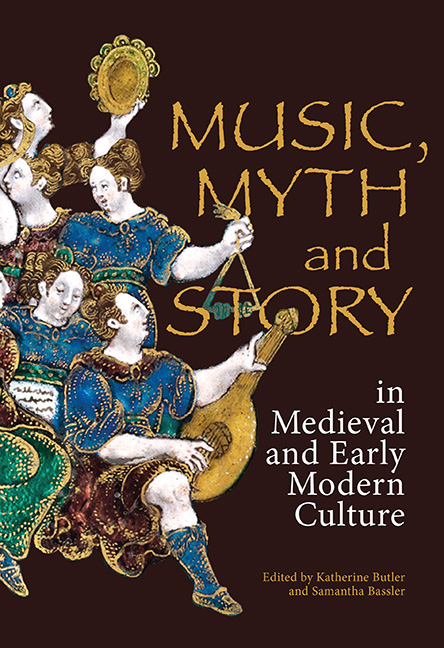Book contents
- Frontmatter
- Contents
- List of Illustrations
- List of Contributors
- Editors’ Note
- Introduction
- I MYTH IN MEDIEVAL MUSIC THEORY AND PHILOSOPHY
- II ICONOLOGIES OF MUSIC AND MYTH
- III MYTHS IN RENAISSANCE PHILOSOPHIES OF MUSIC
- 6 Marsilio Ficino and Girolamo Cardano under Orpheus's Spell
- 7 Origin Myths, Genealogies and Inventors: Defining the Nature of Music in Early Modern England
- IV MYTH AND MUSICAL PRACTICE
- V NARRATIVES OF PERFORMANCE
- VI MYTH AND MUSIC AS FORMS OF KNOWLEDGE
- VII RE-IMAGINING MYTHS AND STORIES FOR THE STAGE
- Bibliography
- Index
- Studies in Medieval and Renaissance Music
7 - Origin Myths, Genealogies and Inventors: Defining the Nature of Music in Early Modern England
from III - MYTHS IN RENAISSANCE PHILOSOPHIES OF MUSIC
Published online by Cambridge University Press: 24 October 2019
- Frontmatter
- Contents
- List of Illustrations
- List of Contributors
- Editors’ Note
- Introduction
- I MYTH IN MEDIEVAL MUSIC THEORY AND PHILOSOPHY
- II ICONOLOGIES OF MUSIC AND MYTH
- III MYTHS IN RENAISSANCE PHILOSOPHIES OF MUSIC
- 6 Marsilio Ficino and Girolamo Cardano under Orpheus's Spell
- 7 Origin Myths, Genealogies and Inventors: Defining the Nature of Music in Early Modern England
- IV MYTH AND MUSICAL PRACTICE
- V NARRATIVES OF PERFORMANCE
- VI MYTH AND MUSIC AS FORMS OF KNOWLEDGE
- VII RE-IMAGINING MYTHS AND STORIES FOR THE STAGE
- Bibliography
- Index
- Studies in Medieval and Renaissance Music
Summary
IN early modern England, a traditional starting point for essays on music was its origins and invention. The Elizabethans inherited numerous myths and theories from classical mythology, bird-lore, the Bible, theology and ancient philosophical thought. These myths included Pythagoras's discovery of the principles of harmony in a blacksmith's hammers, Jubal the biblical inventor of harps and instruments, the assertion that humanity learned music from the birds and the breeze, the Greek inventors of instruments including Amphion, Orpheus, Mercury and Pan, not to mention Pythagorean and Platonic notions of universal harmony. To our current mind-set, these myths – and, indeed, discussion of music's origins – are mere curiosities; however, authors who wrote in praise of music in early modern England did so against a backdrop of radical Protestant attacks on music, which flared up at regular intervals throughout the sixteenth and seventeenth centuries. Issues such as whether music was a gift originating from God, or a worldly, human endeavour, had a particular immediacy and relevancy in this context. While music's defenders would typically go on to explain music's wondrous effects, it was through these stories of origin and invention that thinkers put forward their theories concerning the circumstances and reasons for music's existence.
Authors drawing on these origin myths were faced with the tricky task of charting a path through competing and contradictory stories in order to achieve a meaningful argument. These origin myths explained both the creation of divine and natural harmony, and the development of the human art of music. Moreover, as the term ‘invention’ in the early modern period encompassed both aspects of what we today separate as ‘discovery’ and ‘invention’, the inventors of music could be variously said to have been gifted the knowledge from God, to have discovered harmony in nature, or to have fashioned the musical instrument or art through their own intellect. While some regarded the various inventors of music as historical humans who had become treated as gods because of their great discoveries, most found it productive to read myths allegorically to draw out deeper conceptual truths about music. Similarly, it was not uncommon for authors to combine these historical and allegorical readings.
- Type
- Chapter
- Information
- Music, Myth and Story in Medieval and Early Modern Culture , pp. 124 - 138Publisher: Boydell & BrewerPrint publication year: 2019

